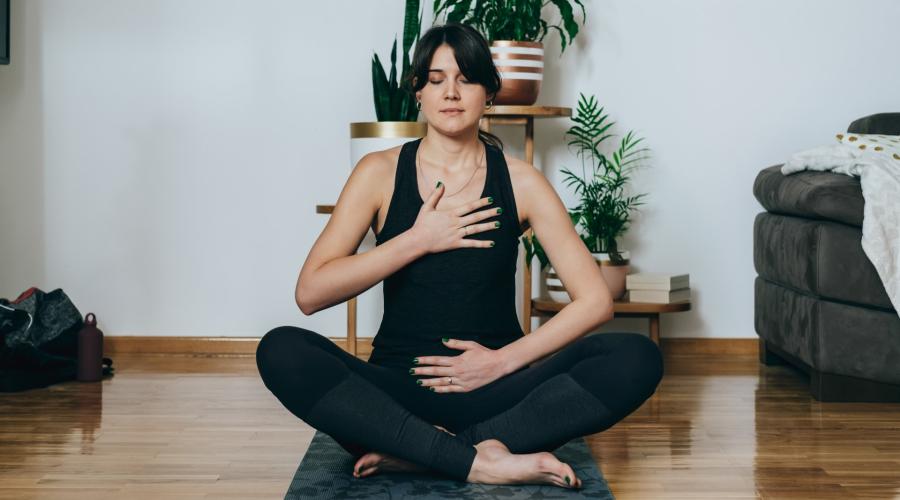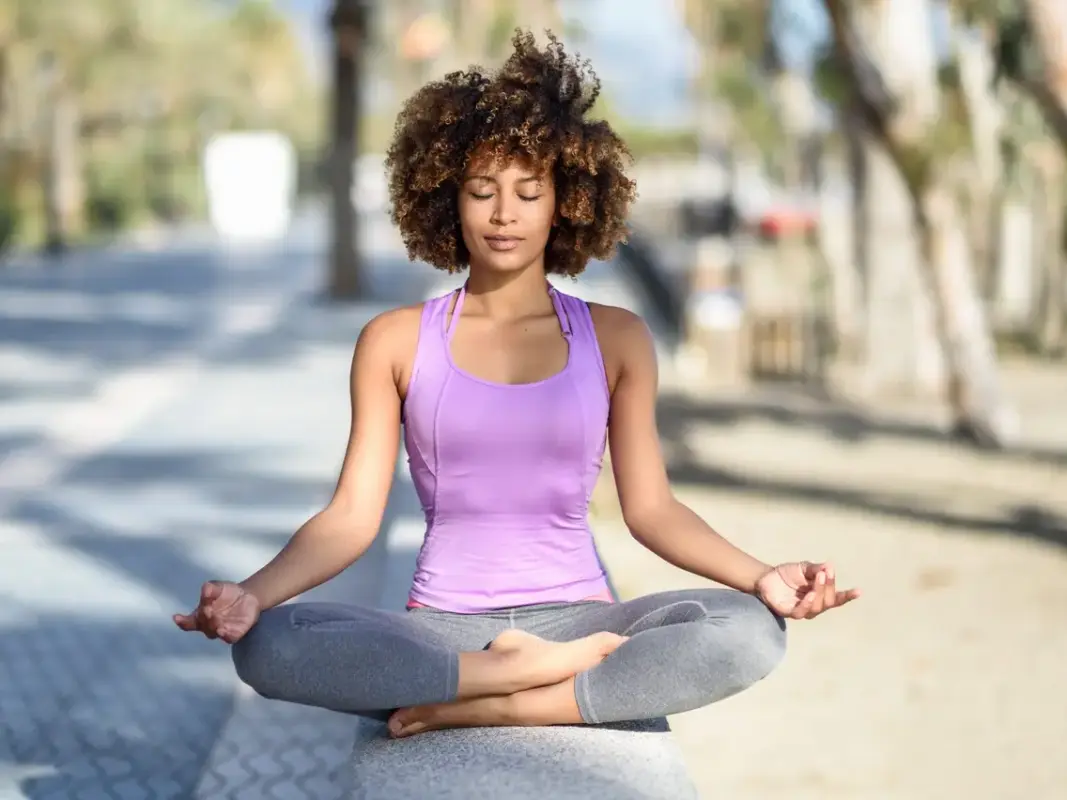Starting a meditation practice can feel overwhelming, but it's a journey worth embarking on. The importance of meditation cannot be overstated—it has been shown to improve mental clarity, reduce stress, and enhance overall well-being. If you're new to meditation, you might be unsure where to begin. Here, we'll explore the top 5 meditation tips for beginners to help you get started on the right foot.
1. Create a Comfortable and Quiet Space

Importance of Environment
The environment in which you meditate significantly impacts your practice. A serene and comfortable space helps you relax and focus. It minimizes distractions and sets a conducive atmosphere for meditation.
Choosing the Right Spot
Select a location in your home where you feel at ease and are less likely to be interrupted. This could be a corner of your bedroom, a dedicated room, or even a spot in your garden. The key is to find a place where you can sit comfortably and undisturbed.
Setting Up Your Meditation Space
Personalize your meditation space to enhance your practice. Use a cushion or a chair that provides good support. Ensure the area is clean and free from clutter. Consider adding elements that promote tranquility, such as candles, incense, or calming music. Soft lighting and natural elements like plants or flowers can also enhance the ambiance.
Read also: Top 10 Benefits Of Hot Yoga For Women
2. Start with Short and Manageable Sessions
Why Start Small?
Starting with short sessions helps you ease into the practice without feeling overwhelmed. It’s better to meditate for a few minutes daily than to attempt long sessions and give up due to frustration.
Initial Duration
Begin with 5 to 10-minute sessions. This duration is manageable and helps you develop consistency. As you become more comfortable, you can gradually increase the duration of your sessions.
Building Consistency
Consistency is crucial for meditation. Try to meditate at the same time each day, integrating it into your daily routine. Whether it’s in the morning to start your day with clarity or in the evening to unwind, find a time that works best for you.
3. Focus on Your Breath

The Power of Breath Awareness
Breath awareness is one of the simplest yet most effective meditation techniques. It serves as an anchor, helping you stay present and centered.
How to Practice Breath Awareness
Sit comfortably, either on a cushion or a chair, with your back straight but relaxed. Close your eyes and bring your attention to your breath. Notice the sensation of air entering and leaving your nostrils. Pay attention to the rise and fall of your chest or abdomen.
Dealing with a Wandering Mind
It’s natural for your mind to wander, especially when you’re new to meditation. When you notice your thoughts drifting, gently bring your focus back to your breath without judgment. Over time, this practice strengthens your concentration and helps quiet the mind.
4. Use Guided Meditations and Apps
Benefits of Guided Meditations
Guided meditations provide structure and support, making them ideal for beginners. An experienced guide can help you navigate the practice, offering instructions and tips that enhance your experience.
Finding the Right Resources
There are numerous guided meditations available online and through apps. Some popular apps include Headspace, Calm, and Insight Timer. These platforms offer a variety of meditations tailored to different needs, such as stress reduction, sleep improvement, and mindfulness.
Exploring Different Themes
Guided meditations come in various themes, allowing you to explore different aspects of meditation. Whether you’re looking to cultivate gratitude, manage anxiety, or develop self-compassion, there’s likely a guided meditation that fits your goals.
Read also: 10 Easy Yoga Poses For Kids
5. Be Patient and Kind to Yourself

Understanding the Journey
Meditation is a journey, not a destination. It’s important to approach your practice with patience and kindness, understanding that progress takes time.
Dealing with Challenges
As a beginner, you may encounter challenges such as restlessness, impatience, or a wandering mind. These experiences are normal. Instead of getting frustrated, acknowledge these challenges and gently guide yourself back to the practice.
Celebrating Small Wins
Recognize and celebrate your progress, no matter how small. Whether it’s completing a week of daily practice or noticing a moment of calm during a stressful day, these milestones are significant. They reinforce your commitment and motivate you to continue.
Integrating Meditation into Daily Life

Creating a Routine
Establishing a meditation routine can help you integrate the practice into your daily life. Choose a consistent time and place for your sessions. Over time, this routine becomes a natural part of your day, much like brushing your teeth or eating meals.
Mindfulness Throughout the Day
In addition to formal meditation sessions, practice mindfulness throughout your day. Mindfulness involves being present and fully engaged in whatever you’re doing. Whether it’s eating, walking, or working, bringing a mindful awareness to these activities enhances your overall well-being.
Connecting with a Community
Joining a meditation group or community can provide additional support and motivation. Sharing your experiences and learning from others fosters a sense of connection and encourages you to maintain your practice. Look for local meditation groups, online forums, or social media communities.
Exploring Different Meditation Techniques

Variety of Techniques
There are numerous meditation techniques available, each offering unique benefits. Exploring different methods can help you find the one that resonates most with you.
Mindfulness Meditation
Mindfulness meditation involves paying attention to the present moment without judgment. This practice helps you develop a heightened awareness of your thoughts, emotions, and sensations.
Loving-Kindness Meditation
Loving-kindness meditation focuses on cultivating compassion and kindness towards yourself and others. This technique involves repeating phrases of goodwill and imagining sending positive energy to those around you.
Body Scan Meditation
Body scan meditation involves systematically focusing on different parts of your body, bringing awareness to physical sensations. This practice promotes relaxation and helps release tension.
Transcendental Meditation
Transcendental Meditation (TM) involves silently repeating a mantra to achieve a deep state of relaxation and awareness. TM requires instruction from a certified teacher and is known for its simplicity and effectiveness.
Read also: 7 Reasons to Slow Down Your Yoga Practice
Common Misconceptions About Meditation

Myth 1: Meditation Is About Emptying Your Mind
One common misconception is that meditation requires you to empty your mind of all thoughts. In reality, meditation is about observing your thoughts without attachment. It’s normal to have thoughts during meditation; the key is to acknowledge them and gently return to your focus.
Myth 2: You Need to Sit in a Lotus Position
While images of people meditating often show them sitting in a lotus position, it’s not necessary. The most important aspect is to find a comfortable position where you can remain still and alert. Whether it’s sitting on a chair, cushion, or even lying down, comfort is key.
Myth 3: Meditation Takes Hours of Practice
You don’t need to meditate for hours to experience benefits. Even a few minutes of meditation each day can make a significant difference. The consistency of your practice is more important than the duration.
The Science Behind Meditation

Mental Health Benefits
Research has shown that meditation can reduce symptoms of anxiety, depression, and stress. It promotes emotional health by helping you develop a positive outlook and better manage negative emotions.
Physical Health Benefits
Meditation has been linked to various physical health benefits, including improved sleep, lower blood pressure, and enhanced immune function. It can also reduce chronic pain and improve overall well-being.
Cognitive Benefits
Regular meditation practice can enhance cognitive functions such as attention, memory, and decision-making. It promotes mental clarity and helps you stay focused and productive.
Conclusion on Top 5 Meditation Tips For Beginners
Starting a meditation practice can seem daunting, but by following these tips, you'll find it easier to begin. Remember to start small, create a comfortable space, focus on your breath, use guided meditations, and be patient with yourself. 5 meditation tips for beginners is a journey, not a destination, and every step you take is a step towards greater well-being.
FAQ's: Top 5 Meditation Tips For Beginners
Q. How long should I meditate as a beginner?
Ans: As a beginner, start with 5 to 10 minutes a day and gradually increase the duration as you become more comfortable with the practice.
Q. Can meditation help with anxiety?
Ans: Yes, meditation can be very effective in reducing anxiety by promoting relaxation and helping you develop a more mindful approach to your thoughts and emotions.
Q. Do I need any special equipment to start meditating?
Ans: No special equipment is necessary. All you need is a quiet, comfortable space where you can sit or lie down without distractions.
Q. How do I know if I’m meditating correctly?
Ans: There’s no one “correct” way to meditate. If you’re focusing on your breath, body sensations, or a specific object of meditation and feeling more relaxed and aware, you’re on the right track.
Is it normal to fall asleep while meditating?
Yes, it’s common to feel sleepy or even fall asleep during meditation, especially if you’re tired. If this happens often, try meditating sitting up rather than lying down.